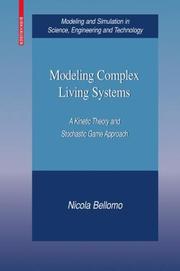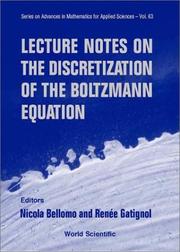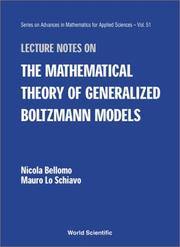| Listing 1 - 10 of 13 | << page >> |
Sort by
|

ISBN: 128111667X 9786611116675 0817646000 0817645101 Year: 2008 Publisher: Boston, MA : London : Birkhauser ; Springer [distributor],
Abstract | Keywords | Export | Availability | Bookmark
 Loading...
Loading...Choose an application
- Reference Manager
- EndNote
- RefWorks (Direct export to RefWorks)
Using tools from mathematical kinetic theory and stochastic game theory, this work deals with the modeling of large complex systems in the applied sciences, particularly those comprised of several interacting individuals whose dynamics follow rules determined by some organized, or even "intelligent" ability. Traditionally, methods of mathematical kinetic theory have been applied to model the evolution of large systems of interacting classical or quantum particles. This book, on the other hand, examines the modeling of living systems as opposed to inert systems. The author develops new mathematical methods and tools—hopefully a "new" mathematics—toward the modeling of living systems. Such tools need to be far more complex than those dealing with systems of inert matter. The first part of the book deals with deriving general evolution equations that can be customized to particular systems of interest in the applied sciences. The second part of the book deals with various models and applications. The presentation unfolds using the following common approach in each chapter: * Phenomenological interpretation of the physical system in the context of mathematical modeling * Derivation of the mathematical model using methods from mathematical kinetic theory for active particles * Simulations, parameter sensitivity analysis, and critical inspection of the derived model towards validation * Overview of presented ideas to improve existing models, with special emphasis on applications Specific topics covered include: * Modeling of the competition between cells of an aggressive invasive agent and cells of the immune system * Modeling of vehicular traffic flow * Modeling of swarms and crowd dynamics in complex geometric environments * Methodological aspects related to multiscale modeling of large systems viewed as interconnected subsystems Modeling Complex Living Systems is a valuable resource for applied mathematicians, engineers, physicists, biologists, economists, and graduate students involved in modeling complex social systems and living matter in general.
System theory. --- Mathematical models. --- Models, Mathematical --- Simulation methods --- Systems, Theory of --- Systems science --- Science --- Philosophy --- Mathematics. --- Mathematical physics. --- Engineering mathematics. --- Mathematical Modeling and Industrial Mathematics. --- Applications of Mathematics. --- Mathematical and Computational Biology. --- Game Theory, Economics, Social and Behav. Sciences. --- Mathematical Methods in Physics. --- Mathematical and Computational Engineering. --- Engineering --- Engineering analysis --- Mathematical analysis --- Physical mathematics --- Physics --- Math --- Mathematics --- Applied mathematics. --- Biomathematics. --- Game theory. --- Physics. --- Natural philosophy --- Philosophy, Natural --- Physical sciences --- Dynamics --- Games, Theory of --- Theory of games --- Mathematical models --- Biology --- Game Theory. --- Mathematical and Computational Engineering Applications. --- Data processing.
Abstract | Keywords | Export | Availability | Bookmark
 Loading...
Loading...Choose an application
- Reference Manager
- EndNote
- RefWorks (Direct export to RefWorks)
Book
ISBN: 1283148730 9786613148735 9814340545 9789814340540 9789814340533 9814340537 9781283148733 Year: 2011 Publisher: Singapore Hackensack, NJ World Scientific
Abstract | Keywords | Export | Availability | Bookmark
 Loading...
Loading...Choose an application
- Reference Manager
- EndNote
- RefWorks (Direct export to RefWorks)
This monograph has the ambitious aim of developing a mathematical theory of complex biological systems with special attention to the phenomena of ageing, degeneration and repair of biological tissues under individual self-repair actions that may have good potential in medical therapy.The approach to mathematically modeling biological systems needs to tackle the additional difficulties generated by the peculiarities of living matter. These include the lack of invariance principles, abilities to express strategies for individual fitness, heterogeneous behaviors, competition up to proliferative a
Biomathematics. --- Biological systems --- Biology --- Mathematics --- Mathematical models.
Book
ISBN: 3030916456 3030916464 Year: 2022 Publisher: Cham, Switzerland : Springer,
Abstract | Keywords | Export | Availability | Bookmark
 Loading...
Loading...Choose an application
- Reference Manager
- EndNote
- RefWorks (Direct export to RefWorks)
Human engineering. --- Social psychology. --- Ergonomia --- Psicologia social --- Pandèmia de COVID-19, 2020 --- -Human engineering. --- -Epidèmia de COVID-19, 2020 --- -COVID-19 (Pandèmia), 2020 --- -Epidèmies --- COVID-19 --- Conducta social --- Psicologia de les masses --- Psicosociologia --- Ecologia humana --- Grups socials --- Sociologia --- Actitud (Psicologia) --- Adaptació social --- Aïllament social --- Alienació (Psicologia social) --- Anomia --- Aprenentatge social --- Atribució (Psicologia social) --- Conducta organitzacional --- Comportament col·lectiu --- Constructivisme social --- Cooperació (Psicologia) --- Dinàmica de grups --- Discriminació --- Elecció social --- Empatia --- Entrevista --- Estigma (Psicologia social) --- Guerra psicològica --- Histèria col·lectiva --- Identitat nacional --- Influència social --- Intel·ligència social --- Interacció social --- Interaccionisme simbòlic --- Intersubjectivitat --- Lideratge --- Conflictes socials --- Memòria col·lectiva --- Moviments socials --- Opinió pública --- Opressió (Psicologia) --- Prestigi --- Psicologia aplicada --- Psicologia crítica --- Psicologia forense --- Psicologia política --- Psiquiatria social --- Relacions humanes --- Representacions socials --- Rol social --- Violència --- Estereotip (Psicologia) --- Etnopsicologia --- Sociologia de l'educació --- Enginyeria humana --- Factors humans en enginyeria --- Biotecnologia --- Enginyeria industrial --- Condicions de treball --- Factors humans en l'arquitectura --- Interacció persona-ordinador --- Sistemes persona-màquina --- Benestar --- Mass psychology --- Psychology, Social --- Human ecology --- Psychology --- Social groups --- Sociology --- Ergonomics --- Human factors in engineering design --- Bioengineering --- Environmental engineering --- Industrial engineering --- Human comfort --- Human-robot interaction --- Ergonomia. --- Psicologia social. --- Pandèmia de COVID-19, 2020-
Book
Abstract | Keywords | Export | Availability | Bookmark
 Loading...
Loading...Choose an application
- Reference Manager
- EndNote
- RefWorks (Direct export to RefWorks)

ISBN: 128194792X 9786611947927 9812796908 9789812796905 9789812382252 9812382259 9812382259 9781281947925 Year: 2003 Publisher: River Edge, NJ World Scientific
Abstract | Keywords | Export | Availability | Bookmark
 Loading...
Loading...Choose an application
- Reference Manager
- EndNote
- RefWorks (Direct export to RefWorks)
This book presents contributions on the following topics: discretization methods in the velocity and space, analysis of the conservation properties, asymptotic convergence to the continuous equation when the number of velocities tends to infinity, and application of discrete models. It consists of ten chapters. Each chapter is written by applied mathematicians who have been active in the field, and whose scientific contributions are well recognized by the scientific community.
Contents:
- From the Boltzmann Equation to Discretized Kinetic Models (N Bellomo & R Gatignol)
Transport theory. --- Finite element method. --- Differential equations --- 517.91 Differential equations --- FEA (Numerical analysis) --- FEM (Numerical analysis) --- Finite element analysis --- Numerical analysis --- Isogeometric analysis --- Boltzmann transport equation --- Transport phenomena --- Mathematical physics --- Particles (Nuclear physics) --- Radiation --- Statistical mechanics --- Asymptotic theory.

ISBN: 9812813330 9789812813336 9810240783 9789810240783 Year: 2000 Publisher: River Edge, NJ World Scientific
Abstract | Keywords | Export | Availability | Bookmark
 Loading...
Loading...Choose an application
- Reference Manager
- EndNote
- RefWorks (Direct export to RefWorks)
This book is based on the idea that Boltzmann-like modelling methods can be developed to design, with special attention to applied sciences, kinetic-type models which are called generalized kinetic models. In particular, these models appear in evolution equations for the statistical distribution over the physical state of each individual of a large population. The evolution is determined both by interactions among individuals and by external actions. Considering that generalized kinetic models can play an important role in dealing with several interesting systems in applied sciences, the book provides a unified presentation of this topic with direct reference to modelling, mathematical statement of problems, qualitative and computational analysis, and applications. Models reported and proposed in the book refer to several fields of natural, applied and technological sciences. In particular, the following classes of models are discussed: population dynamics and socio-economic behaviours, models of aggregation and fragmentation phenomena, models of biology and immunology, traffic flow models, models of mixtures and particles undergoing classic and dissipative interactions.
Maxwell-Boltzmann distribution law. --- Kinetic theory of matter --- Matter, Kinetic theory of --- Matter --- Molecular theory --- Statistical mechanics --- Boltzmann distribution law --- Maxwell-Boltzmann density function --- Maxwell distribution --- Distribution (Probability theory) --- Kinetic theory of gases --- Mathematical models.
Book
ISBN: 3030965627 3030965619 Year: 2022 Publisher: Cham, Switzerland : Birkhäuser,
Abstract | Keywords | Export | Availability | Bookmark
 Loading...
Loading...Choose an application
- Reference Manager
- EndNote
- RefWorks (Direct export to RefWorks)
Epidèmies --- COVID-19 --- Models matemàtics --- Models (Matemàtica) --- Models experimentals --- Models teòrics --- Mètodes de simulació --- Anàlisi de sistemes --- Mètode de Montecarlo --- Modelització multiescala --- Models economètrics --- Models lineals (Estadística) --- Models multinivell (Estadística) --- Models no lineals (Estadística) --- Programació (Ordinadors) --- Simulació per ordinador --- Teoria de màquines --- Models biològics --- COVID-19 (Malaltia) --- Coronavirus 2019 (Malaltia) --- Malaltia COVID-19 --- Malaltia infecciosa per SARS-CoV-2 --- Malaltia infecciosa per coronavirus --- Malaltia per coronavirus 2019 --- Malaltia respiratòria causada pel SARS-CoV-2 --- Pneumònia de Wuhan --- Infeccions per coronavirus --- Pandèmia de COVID-19, 2020 --- -SARS-CoV-2 --- Endèmias --- Malalties epidèmiques --- Pandèmies --- Pestes --- Epidemiologia --- Còlera --- Epidèmia de grip, 1918-1919 --- Febre groga --- -Pesta --- Pesta Negra --- Epidemiology --- Mathematical models.
Book
ISBN: 3030933016 3030933024 Year: 2022 Publisher: Cham, Switzerland : Springer International Publishing,
Abstract | Keywords | Export | Availability | Bookmark
 Loading...
Loading...Choose an application
- Reference Manager
- EndNote
- RefWorks (Direct export to RefWorks)
Mathematical optimization. --- Mathematical optimization --- Computer programs. --- Optimization (Mathematics) --- Optimization techniques --- Optimization theory --- Systems optimization --- Mathematical analysis --- Maxima and minima --- Operations research --- Simulation methods --- System analysis --- Models matemàtics --- Optimització matemàtica --- Mètodes de simulació --- Jocs d'estratègia (Matemàtica) --- Optimització combinatòria --- Programació dinàmica --- Programació (Matemàtica) --- Anàlisi de sistemes --- Models (Matemàtica) --- Models experimentals --- Models teòrics --- Mètode de Montecarlo --- Modelització multiescala --- Models economètrics --- Models lineals (Estadística) --- Models multinivell (Estadística) --- Models no lineals (Estadística) --- Programació (Ordinadors) --- Simulació per ordinador --- Teoria de màquines --- Models biològics
Multi
ISBN: 9781461472421 1461472423 Year: 2013 Publisher: New York : Springer,
Abstract | Keywords | Export | Availability | Bookmark
 Loading...
Loading...Choose an application
- Reference Manager
- EndNote
- RefWorks (Direct export to RefWorks)
This work aims to foster the interdisciplinary dialogue between mathematicians and socio-economic scientists. Interaction among scholars and practitioners traditionally coming from different research areas is necessary more than ever in order to better understand many real-world problems we face today. On the one hand, mathematicians need economists and social scientists to better address the methodologies they design in a more realistic way; on the other hand, economists and social scientists need to be aware of sound mathematical modelling tools in order to understand and, ultimately, solve the complex problems they encounter in their research. With this goal in mind, this work is designed to take into account a multidisciplinary approach that will encourage the transfer of knowledge, ideas, and methodology from one discipline to the other. In particular, the work has three main themes: Demystifying and unravelling complex systems; Introducing models of individual behaviours in the social and economic sciences; Modelling socio-economic sciences as complex living systems. Specific tools examined in the work include a recently developed modelling approach using stochastic game theory within the framework of statistical mechanics and progressing up to modeling Darwinian evolution. Special attention is also devoted to social network theory as a fundamental instrument for the understanding of socio-economic systems.
Social sciences (general) --- Economics --- Operational research. Game theory --- Mathematics --- Planning (firm) --- kennis --- toegepaste wiskunde --- mathematische modellen --- sociale wetenschappen --- speltheorie --- wiskunde --- Social sciences --- Mathematical models.
| Listing 1 - 10 of 13 | << page >> |
Sort by
|

 Search
Search Feedback
Feedback About UniCat
About UniCat  Help
Help News
News